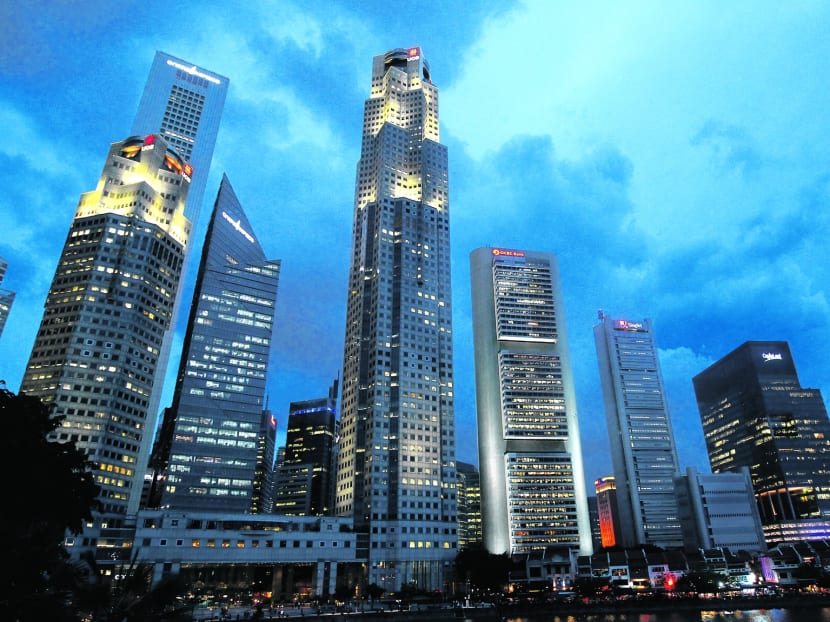Artists reject MDA’s self-regulations
SINGAPORE — A total of 45 arts groups — including most of the big players across the fields of theatre, dance, music and visual art, such as Wild Rice, The Necessary Stage, and Pangdemonium Productions — have voiced their objections to the Media Development Authority’s (MDA) Arts Term Licensing Scheme, which aims to let practitioners classify their own performances.

UBS has hired 88 client advisers in Asia-Pacific and they are mostly based in Hong Kong and Singapore. TODAY FILE PHOTO
SINGAPORE — A total of 45 arts groups — including most of the big players across the fields of theatre, dance, music and visual art, such as Wild Rice, The Necessary Stage, and Pangdemonium Productions — have voiced their objections to the Media Development Authority’s (MDA) Arts Term Licensing Scheme, which aims to let practitioners classify their own performances.
A position paper issued yesterday from Arts Engage, a network of Singapore arts practitioners, described it as damaging to the arts industry. It warned that the scheme could lead to self-censorship and urged the MDA to engage artists and the general public in more consultations before it is rolled out. The paper — which has been submitted to the MDA — was signed by the groups after an arts community town hall meeting on May 17.
The proposed scheme was first announced last year, together with other amendments to the Public Entertainments and Meetings Act. The MDA wrapped up its public consultations on May 30. The scheme, which is optional, is slated to roll out next year, with a pilot run set for July.
Currently, arts groups apply for an individual licence two months before a performance, with the MDA classifying the content. Under the proposed scheme, groups will be categorised into two tiers.
Groups under Tier 1 can self-classify works with a General rating — but unscripted performances, or those touching on race, religion or politics, will still have to be submitted to the MDA for an event-based licence.
Tier 2 groups, which will be determined by the MDA after assessing the groups’ track record, can self-classify up to a Restricted 18 rating.
Self-classification for their performances will be done by representatives from the groups themselves, who will be trained by the MDA as “content assessors”.
But there are fears that this will lead to self-censorship. “Under the threat of hefty fines and penalties, we expect self-censorship to be more prevalent as producers, practitioners and ‘content assessors’ begin to fear the consequences of wrongly implementing the classification codes,” the paper said.
With guidelines and criteria already pre-determined by the MDA, the paper added, “content assessors” become merely “MDA officers by proxy”.
“It’s basically passing the responsibility to us but they have the power of penalties,” said Ms Kuo Jian Hong, Artistic Director of The Theatre Practice, one of the signatories.
“The SOP now is we submit, they classify. If there’s a mistake, they can choose to rectify or not, there’s a dialogue going on. But (with the) new proposal, we are basically asked to self-police and use the rules they have set, which aren’t even consistent,” she added.
The scheme directly affects performing arts groups but a number of groups from other fields have also come out in support of the position paper.
“If it affects the performing arts in general, I think it only makes sense for us to stand with everyone else,” said Ms Vivian Wang of independent band The Observatory, one of the music group signatories. “I don’t think anyone is against the idea of responsible expression in the arts but (classification) is not our task,” she added.
“We are not affected but I think we are involved in the sense that it’s still an issue for the arts community,” said Ms Charmaine Toh, curator and founder of The Art Incubator, one of the visual art group signatories.
In response to the position paper, Ms Chetra Sinnathamby, the MDA’s Director of Content and Standards (Films, Video Games & Arts), said: “We will carefully review the feedback provided during the public consultation process”.
She also emphasised that the scheme is optional.
“The objective is to empower industry players to classify the performances and events which they stage, while being mindful of prevailing community standards and expectations. Those who choose to participate in the scheme enjoy cost and time savings, while those do not wish to can continue to submit their individual applications to MDA,” Ms Sinnathamby said.
Meanwhile, Mr Robert Liew, Director of Arts Management Associates and a member of the MDA’s Arts Consultative Panel, views the scheme as a “great administrative convenience”.
“There seems a built-in flexibility as well — we can opt out of self-classification for shows that we find difficult to classify.”
As for objections from some quarters, Mr Liew said: “(They) seem to be based on an outright opposition to any kind of regulation, rather than the proposed new scheme. This seems understandable as we move towards greater liberalisation of content. While arts managers may square up and eventually step up to the challenges of co-regulating, I think artists will find the task an additional encumbrance to their creativity.”








